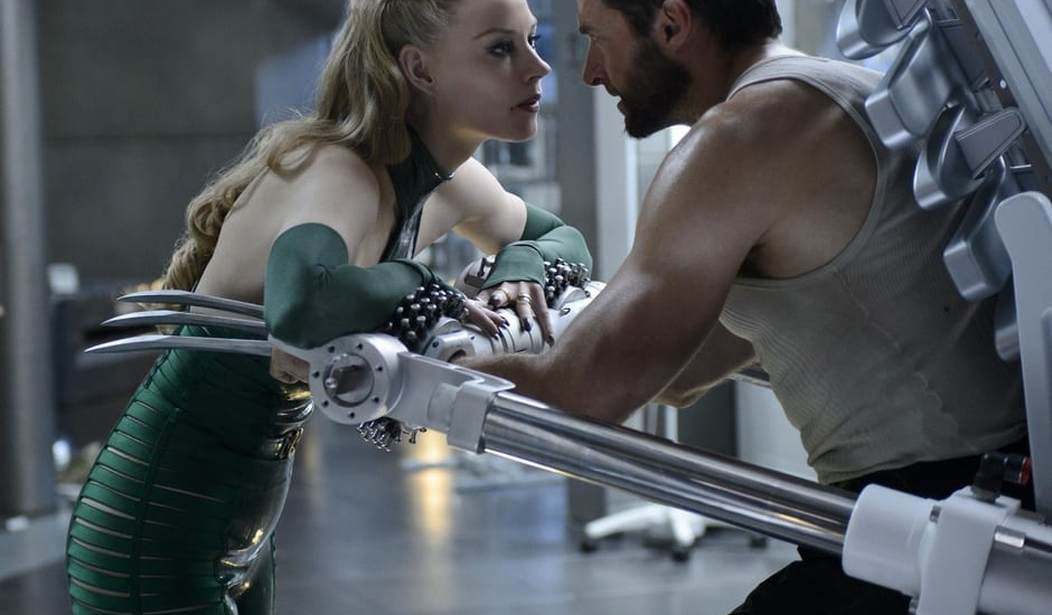[This post contains major spoilers. Don’t read it if you haven’t seen the film and intend to see it.]
It was Doctor Strange that convinced me I was done with superhero movies — not because the film was bad, but because it was good. I’m a big fan of writer/director Scott Derrickson. The Exorcism of Emily Rose and Sinister are both terrific, and Strange is as well-done and expert as these things get.
And because I found nothing much to criticize in the movie, I realized it was the genre itself that had begun to bore me. Every story is the droning, groaning same: the hero’s personal tragedy, his acquisition of powers through or with the aid of zen-like mental training, his return to take up responsibility and confront evil, the final fight in which he destroys a city and saves the world. I get it. Believe me, I’ve read every word Joseph Campbell ever wrote. I know the monomyth backward and forward. But give it a rest. It’s not the only tale worth telling.
But Logan — the new James Mangold film starring Hugh Jackman that tells the final adventure of the X-Men hero Wolverine — is different; better. It is to superhero movies what Clint Eastwood’s Unforgiven is to westerns: a valediction to a genre, and a justification of its purpose.
The story takes place in a future when the X-Men’s story is essentially over. They’re all dead, killed apparently by their mentor Professor Xavier in a misuse of his mighty powers brought on by old age and dementia. Wolverine, dying of something like cancer, drives a limo, trying to raise the money to help his failing father-figure escape the law on a boat named Sunseeker. Drawn into helping a little girl on the run — a girl who turns out to be a little Wolverette created from Logan’s DNA — Logan, Xavier and the girl, Laura, begin a fatal odyssey, looking to rejoin the child’s fellow mutants at a rendezvous called Eden.
Mangold shoots, plots and paces the film like a cross between a film noir and a classic western, Touch of Evil meets Shane. That’s what gives it its depth and humanity. But it’s also, I think, part of the movie’s theme and purpose. Mangold is dignifying the superhero genre by linking its mythos to American myths of the past and their underlying meaning. Not to get carried away over an X-Men movie — The Divine Comedy it ain’t — but it does use the same strategy Dante used when he let the classic poet Virgil guide him before going on alone. The message is: this is a new thing but it carries on the work of the great old things of the past.
Logan’s key scene takes place in a hotel room, where Laura, an unsocialized child raised in a cloning facility (flashbacks which seemed a bit, let’s say inspired, by the socko novel The Girl With All the Gifts), actually watches Shane on TV. She sees a funeral scene in which a man says the Lord’s Prayer, and later watches the movie’s end where Shane rides off after telling the boy who loves him, “There are no more guns in the valley.”
Shane is famously a symbolic Christ story. His name is Hebrew for “Gift from God.” He descends into the valley, gives his life to save the people there, and rides away with the world crying after him, “Come back!” At the end of Logan, when Laura buries Wolverine under a cross of sticks, she eulogizes him with the final speech from Shane: “There are no more guns.” That has become her Lord’s Prayer. Then she turns over the cross to form an X.
The sequence is clear. The Christ story becomes the western, the western becomes the superhero tale, the superhero tale tells the Christ story again, a new myth to convey the old meaning. Laura has learned about Eden from an X-Men comic book so the film’s question is: does the story these myths tell us still lead us to true redemption?
The validity and relevance of this question are all the more important in the world of the film, a world in which people are created in test tubes and so men and women have lost the physical purposes and roles that originally shaped their values. Unlike in Shane, there is no sexual conflict in Logan. In Shane, the mother, like her son, must choose between the bad boy of the wild west and the farmer Dad who creates civilization. In Logan, there is no mother, just father, son and cloned child. The traditional family — held up as the Good Life in the movie’s most touching scene — is a nostalgic throwback which doesn’t survive the adventure.
Logan’s world — in which family, masculinity and femininity become spiritual values rather than physical necessities — is a world we can already see coming at us, getting closer every day. The question of whether the Christ story will still matter in such a world is an urgent one.
Logan answers in the inspiring affirmative. It’s a smart, lovely film.
For more commentary, listen to my podcast Mondays through Thursdays.









Join the conversation as a VIP Member